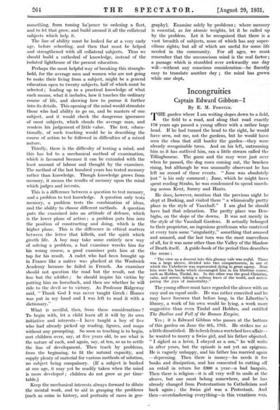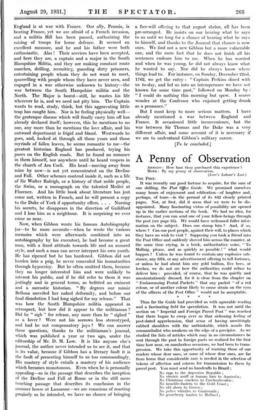Incongruities
Captain Edward Gibbon—I
By E. M. FORSTER.
THE garden where I am writing slopes down to a field, the field to a road, and along that road exactly 170 years ago passed a young officer with a rather large head. If he had turned the head to the right, he would have seen, not me, not the gardens, but he would have seen the elms that still border the garden—they were already recognizable trees. And on his left, outrunning him as it has outlived him, ran a little stream called the Tillingbourne. The gorse and the may were just over when he passed, the dog roses coming out, the bracken rising, but although he was unusually observant he has left no record of these events. "June was absolutely lost" is his only comment ; June, which he might have spent reading Strabo, he was condemned to spend march- ing across Kent, Surrey and Hants.
He does, however, mention that the previous night he slept at Dorking, and visited there "a whimsically pretty place in the style of Vauxhall." I am glad he should have had that relaxation. The pretty place was Den- bighs, on the slope of the downs. It was not merely in the style of the Vauxhall Gardens. It actually belonged to their proprietor, an ingenious gentleman who contrived at every turn some "singularity," something that amused and amazed, and the last turn was the most marvellous of all, for it was none other than the Valley of the Shadow of Death itself. A guide-book of the period thus describes the scene : "The view on a descent into this gloomy vale was awful. There was a large alcove, divided into two compartments, in one of which the Unbeliever was represented dying in great agony. Near him were his books which encouraged him in his libertine course, such as Hobbes, Tindal, tte. In the other was the good Christian, calm, and serene, taking a solemn leave of the world, and antici- pating the joys of immortality."
The young officer must have regarded the alcove with an easy and an equal smile. He was rather conceited and he may have foreseen that before long, in the Libertine's library, a work of his own would be lying, a work more suggestive than even Tindal and Hobbes, and entitled The Decline and Fall of the Roman Empire.
Yes ; it is Edward Gibbon who passes at the bottom of this garden on June the 8th, 1761. He strikes me as a little dissatisfied. He is fresh from a wretched love affair— he wanted to marry a Swiss girl, and his father objected. "I sighed as a lover, I obeyed as a son," he will, write in after years, but the episode is not yet an epigram. He is vaguely unhappy, and his father has married again —depressing.. Then there is money—he needs it for books and dissipation, and has consented to cutting off an entail in return for £300 a year=a bad bargain. Then there is religion—it is all very well to smile at the alcove, but one must belong somewhere, and he has already changed from Protestantism to Catholicism and back again ; the Swiss girl was a Protestant4 And then—overshadowing everything—i,s this vexatious war, England is at war with France. Our ally, Prussia, is beating France, yet we are afraid of a French invasion, and a militia Bill has been passed, authorizing the raising of troops for home defence. It seemed an excellent measure, and he and his father were both enthusiastic. Alas ! Their services have been accepted, and here they are, a captain and a major in the South Hampshire Militia, and they are making constant route marches, drilling, recruiting, guarding dirty prisoners, entertaining people whom they do not want to meet, quarrelling with people whom they have never seen, and engaged in a war otherwise unknown to history—the war between the South Hampshire militia and the North. The Major is bored—still, he wastes his life wherever he is, and we need not pity him. The Captain wants to read, study, think, but this aggravating little trap has caught him. Nor is he feeling physically well— the grotesque disease which will finally carry him off has already declared itself; however, this he mentions to no one, any more than he mentions the love affair, and his outward deportment is frigid and bland. Westwards he goes, and, looked at through all those years and those myriads of fallen leaves, he seems romantic to me—the greatest historian England has produced, trying his paces on the English roads. But he found no romance in them himself, nor anywhere until he heard vespers in the church of Ara Coeli. His head—moving away from mine by now—is not yet concentrated on the Decline and Fall. Other schemes contend inside it, such as a life of Sir Walter Raleigh, or a history of that noble people, the Swiss, or a monograph on the talented Medici at Florence. And his little book about literature has just come out, written in French, and he will present a copy to the Duke of York if opportunity offers. . . . Nursing his secrets, he disappears in the direction of Guildford and I lose him as a neighbour. It is surprising we ever came so near.
Now, when Gibbon wrote his famous Autobiography (or—to be more accurate—when he wrote the various memoirs which were afterwards combined into an autobiography by his executor), he had become a great man, with a fixed attitude towards life and an assured style, and such a man can never interpret his own youth. He has ripened but he has hardened. Gibbon did not harden into a prig, he never concealed his immaturities through hypocrisy. But he often omitted them, because they no longer interested him and were unlikely to interest his public, and if he did refer to them it was jestingly and in general terms, as befitted an eminent and a sarcastic historian. "By degrees our mimic Bellona unveiled her naked deformity, and before our final dissolution I had long sighed for my release." That was how the South Hampshire militia appeared in retrospect, but how did it appear to the militiaman? Did he "sigh " for release, any more than he "sighed " as a lover ? Were not his sorrows less stereotyped, and had he not compensatory joys ? We can answer these questions, thanks to the militiaman's journal; which was published a year or two ago, under the editorship of Mr. D. M. Low. It is like anyone else's journal, the author never intended us to see it, and that is its value, because if Gibbon has a literary fault it is the fault of presenting himself to us too commandingly. His mastery of style entails a mastery of his audience which becomes monotonous. Even when he is personally appealing—as in the passage that describes the inception of the Decline and Fall at Rome or in the still more touching passage that describes its conclusion in the summer house at Lausanne—we are conscious of reacting precisely as he intended, we have no chance of bringing a free-will offering to that august shrine, all has been pre-arranged. He insists on our hearing what he says to us until we long for a chance of hearing what he says to himself, and thanks to the Journal that chance is now ours. We find not a new Gibbon but a more vulnerable one, and the mere fact that he does not finish all his sentences endears him to me. When he has worried and when he was young, he did not always know what he wanted to say. Nor did he always know where things lead to. For instance, on Sunday, December 22nd, 1762, we get the entry : "Captain Perkins dined with us to-day, and led us into an intemperance we have not known for some time past," followed on Monday by : "I could do nothing this morning but spew. I scarce wonder at the Confessor who enjoined getting drunk as a pennance."
But I must keep to more serious matters. I have already mentioned a war between England and France. It occasioned little inconvenience, but the war between Sir Thomas and the Duke was a very different affair, and some account of it is necessary if we are to understand Gibbon's military career.
[To be concluded.]



























 Previous page
Previous page